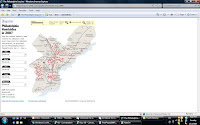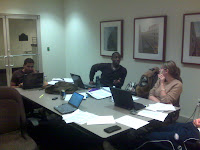2007 Wharton Winter Ball
전에 말하였듯이 금요일은 수업은 없으며, 다양한 행사와 파티를 한다. 오늘은 약간 특별하고 새로운 파티가 있어서 몇일전부터 지현이랑 아주 단단히 준비를 하고 있었다. 바로 일년에 한번 하는 2007 Wharton Winter Ball이 오늘 밤 10시부터 새벽 2시까지 DoubleTree Hotel에서 열린다. Ball이라고 하면 굉장히 fancy하게 들리는데 실제로 상당히 fancy하다. 모두들 화려하게 차려입고 (여자들은 드레스 / 남자들은 턱시도 또는 정장+tie) 수업시간과는 사뭇 다르게 술도 먹으면서 춤도 추고, 같은 cohort가 아닌 classmate들과 이야기도 하는 멋진 행사이다.
나는 턱시도가 없어서 그냥 양복에 타이, 지현이는 새로산 드레스를 입고 오래간만에 부부가 화려한 외출을 했다. 인당 $85 이라는 만만치 않은 입장료를 지불하였기 때문에 본전을 뽑기 위해서 최대한 술을 많이 먹기로 하고 Ball이 열리는 Ormandy Hall에 들어갔다. Open Bar에는 우리와 비슷한 생각으로 술을 먹기 위한 엄청난 줄이 있었고, 여기저기 삼삼오오 사람들이 서서 웃으면서 이야기를 하고 있었다. 저쪽에 Travis와 Karen 부부가 보여서 술 한잔 하면서 이런저런 이야기를 하다가 또 여기저기서 아는 얼굴들이 등장하여 인사하고 지현이 인사시켜주고, 또 상대방 파트너와 인사하고…이러다 보니 이미 자정이 넘어버렸다. 안타깝게도 한국 학생들은 거의 볼 수가 없었다. George Song과 Sunny 정도만 보였고, 그 많은 80명이나 되는 한국 학생들은 한명도 볼 수 없었다. 이런 social 행사에 오고 안오고는 물론 본인이 결정할 문제이다. But, 이왕 미국에 온김에 이런 미국적인 행사는 참석하는게 좋은게 아닌가 싶다. 나는 특히 좋았던 점이 우리 두 부부가 서로 즐길 수 있는 자리여서 더 뜻깊었던거 같았다. 나도 나름대로 멋지게 입고 파티에 가서 즐거웠지만, 같이 미국 생활을 하는 지현이도 이런 자리를 통해서 남편이 어떤 사람들과 같이 공부하고 어떤 분위기에 노출되어 있는지에 대해서 알아야 한다고 생각한다. 오랜만에 늦게까지 술마시면서 시끄러운 음악에 노출되서 귀도 멍멍하였지만, 기분 좋은 하루였다.
집에 와서 Prison Break 몇 편을 더 보다가 잠들었다.
MGMT 654 전략 – Nucor의 결정
Business Ethics class와 MBA
내일부터 길고 긴 4일간의 Thankgiving 연휴가 시작된다. 모두들 가족과 함께 하기 위해서 오늘 또는 내일 Philadelphia를 떠난다. 오늘 수업시간에 많은 학생들이 수트케이스를 아예 드르륵 끌면서 강의실에 가져오는 경우도 많았다. 오늘 9시 수업은 Ethics and Responsibility..내가 가장 싫어하는 수업 중 하나이다. 기업윤리라는 말 자체가 너무나 애매모호한 말이 아닌가? 이윤을 극대화해야하는 기업이 윤리를 준수해야한다는 말처럼 아이러닉한 말이 없는거 같다. 그래도 이 수업은 모든 학생들이 들어야하는 core 수업이기 때문에 빠져나갈 길은 없다…아니나 다를까, 내용은 너무나 soft한 내용이었다…at least so far…
Harvard Business School 교수: 한 제조업체가 있었는데, 이 회사가 제조하는 제품이 인체에 유해할 수도 있다는 1차적인 결론을 내렸지만, 최종 결론은 아니었으며 유해성이 검증되지는 않았다. 만약 여러분들이 이 회사의 CEO였다면 이 제품을 제조해서 시장에 공급하겠는가?
Jeff라는 학생: 저는 당연히 이 제품을 계속 만들어서 공급하겠습니다. CEO의 목표는 기업의 이윤을 창출하여 주주들의 가치를 극대화하는것입니다. 이 제품이 인체에 유해하다면 제지를 해야하는 거는 정부의 역할이라고 생각합니다.
Mark Schwartz 교수가 다음과 같은 질문을 하였다. “이 Jeff는 누구일까요?”
ㅋㅋㅋ 바로 Enron의 전 CEO였던 Jeff Skilling이었다. 여러분들은 이와 같은 상황에서는 어떻게 하였을까요?
나는 Jeff Skilling보다는 Enron사의 Board of Directors한테 Enron 스캔들에 대한 책임을 묻고 싶다 (물론 이 문제는 복합적인 문제인 관계로 누구 한명을 욕할 수는 없지만, 만약 한 사람을 지적하라고 하면 이렇게 하겠다는 말이다..) 한 회사의 CEO는 본인의 의견보다는 그 외부사람들과 요인들한테 많은 영향을 받는다고 생각한다. 물론 Jeff 같은 경우에는 그 정도를 지나치게 남용하였다는 생각도 든다만…
Business Ethics….애매하지만, 중요한 이슈이다. 내 생각은, 기업 윤리는 일단 기업이 존재하여야지만 생각할 수 있는 것이다. 가령, 내가 망해가는 회사를 살리기 위해서 정부에 뇌물을 줘야하는 상황에 쳐해있다고 가정해보자..뇌물을 줘도 남들이 전혀 모르게 처리할 수 있으면 기업윤리에 입각하여 비윤리적인 행동이니 그냥 가만히 회사가 망해가는 걸 볼까? 아니면 걸리지 않을게 확실하니 그냥 비윤리적인 행동을 저지른 후에 회사를 살릴까? 나도 잘 모르겠지만 CEO의 입장에서 본다면 상당히 힘든 결정을 해야할거 같다. 이 질문에 대한 답은 Wharton에서도 명쾌히 가르쳐 주지 못하는거 같다….윤리 수업에서는 “절대로 그래서는 안된다. CEO는 청렴결백해야하면 윤리적으로 행동해야한다” 라고 하지만, 솔직히 MBA 수업의 핵심은 “기업의 목표는 이윤의 극대화이며, 와튼 MBA 학생들은 졸업 후 돈을 만들어내는 기계가 되어야 한다.” 인데…이 참 아이러니컬한게 아닐 수 없다…
Happy Thanksgiving everybody!!
Why Warren Buffett’s Keen on Korea
오늘 BusinessWeek지를 보니, Warren Buffett과 한국과 관련된 재미있는 기사가 있었다. 지난 번에 소개하였던 Jeremy Siegel 교수가 쓴 글과도 일맥상통하는 내용같다.
Why Warren Buffett’s Keen on Korea
“Attractively priced” stocks, healthy debt ratios, plus solid manufacturing prowess position Korea to profit from growth in China and the Mideast
by Moon Ihlwan
In other parts of the world, South Korea’s gross domestic product growth—projected at around 5% this year—would make it a high-profile destination for portfolio managers. But since Korea is in Asia, the country is largely overshadowed by the dazzling economic performances of China and India. As concerns grow about overvalued Chinese and Indian stocks, though, money managers shuffling their Asian portfolios are finding Korea increasingly attractive. For American billionaire investor Warren Buffett, for example, China is out, and Korea is in. During his visit to Asia late last month, Buffett cautioned against overreaching in China. Yet he expressed confidence in Korean equities, describing the country as “one of the world’s most attractively priced markets.”
Indeed, Buffett’s holding in Korean steelmaker Posco (PKXFF) is one of his top-performing stock investments this year. Buffett’s Berkshire Hathaway (BRKA) spent $572 million over the past three years or so for a 4% stake in Posco, one of the most profitable steelmakers on the planet, and that stake is now worth well over $2 billion. Berkshire recently sold off its shares in PetroChina, the only Chinese company it owned, but Buffett said during his brief visit to Korea on Oct. 25 that he would hang on to Posco. “It’s a great company and great companies get worth more and more,” he said.
Certainly Korea is not immune to the turmoil shaking markets worldwide. Shocks from the U.S. credit crisis and soaring oil prices have pared the Seoul exchange’s benchmark Kospi index by around 9% this month. Weaker-than-expected tech demand has sent prices nose-diving in memory chips (BusinessWeek.com, 6/15/07), where the Koreans rule.
Samsung Electronics (SSNGY), the bellwether for the country’s information technology sector, has fallen nearly 15% this year and has laid off some 1,600 workers, almost 2% of its workforce.
Korea Excels in Shipbuilding
Still, the benchmark Kospi index is up about 30% from the end of last year, a reflection of strong growth in other parts of the Korean economy. A major attraction is the country’s manufacturing prowess in diversified industries. Korea’s shipbuilding, steel, petrochemical, and other smokestack companies are booming as emerging economies spend heavily to build up their infrastructure and as their shipping trade explodes. “A number of Korean companies are dominant forces in cyclical industries and have historically outperformed their global peers when their industries are in an upswing,” says Yang Ho Chull, chief executive of Morgan Stanley (MS) Korea. “What’s particularly attractive for portfolio managers is the strong performance of these companies, fueled by the rapid growth of China.”
Consider the shipbuilding industry. As China turns into the factory of the world, demand for new ships to carry China trade is expected to remain strong until at least 2010, according to a report by the Bank of Korea, the central bank in Seoul. That means Korea’s shipbuilding firms, which built 41% of all ships delivered last year and include the world’s top three players—Hyundai Heavy Industries (HYHZF), Samsung Heavy Industries (SMSHF), and Daewoo Shipbuilding & Engineering (DWOSF)—will enjoy a boom (BusinessWeek.com, 5/18/07) for a few more years.
The influx of shipbuilding revenue to Korea is so huge that the central bank warned this month against further appreciation of the Korean currency. The shipbuilders, who are sitting on enough work for almost four years, cash in their future revenues to be received in dollars on the forward market to hedge against currency risks. Banks that take up the forward deals then sell dollars for the won on the spot market to offset their dollar forward purchases, and subsequently borrow dollars abroad to settle their spot deals, in the process pushing up the won. Little wonder the share price of Hyundai Heavy, the global shipbuilding leader, has more than tripled so far this year. On Nov. 8, the world’s top shipbuilder released its third-quarter results, reporting that its net profit more than doubled, to $475 million, from $230 million in the July-September period last year.
Greater Transparency Means Higher Stock Prices
Other cyclical sectors such as steel and petrochemical industries are also benefiting from rapid development of emerging markets. LG Chem (LGCLY), Korea’s largest petrochemical company, churns out products ranging from plastics to flooring and automotive parts. It posted a 73% jump in its net profit, to $229 million, in the third quarter. LG shares have jumped 120% so far this year.
The introduction of global corporate standards in Korea since the 1997 Asian crisis has also paved the way for share gains. “In the past, the Korean market has traded at a relative discount because of a lack of transparency and liquidity; but with significant improvement in these areas, the discount, at least for the leading 40 or 50 Korean companies, is disappearing. It is no longer a major issue,” reckons Yang at Morgan Stanley.
Corporate restructuring since the crisis has also improved the financial health of Korean companies. Economist Lim Kyung Mook at Korea Development Institute, a government-funded think tank, points out that the country’s average corporate debt, which used to be as high as four times equity in the late 1990s, has been cut to below 100% of equity. “Many Korean companies are now sitting on a cash pile big enough for them to weather a downturn and reap handsome profits from the next upturn,” Lim says.
Higher Oil Prices Help Korean Contractors
Take LG.Philips LCD (LPL), which has maintained its debt level well below half its equity. The world’s second-largest maker of liquid-crystal display (LCD) panels was bleeding red ink for four consecutive quarters until March of this year because of a supply glut in the industry. Yet the company last month reported a net profit of $573 million for the July-September period, its strongest profit in 13 quarters, against a loss of $249 million a year earlier, as demand for thin panels for computers and TVs grew.
Even an upsurge in oil prices is translating into a bonanza for engineering and construction companies in oil-importing Korea. That’s because the Koreans take a big chunk of the red-hot Middle East construction market. Much of the money earned from high oil prices is spent in building new refineries, petrochemical plants, highways and water desalinization plants, where Korean contractors are strong.
There’s no sign the stream of new construction orders will slow soon. In Dubai, the world’s largest building, the world’s largest indoor ski slope, and three artificial islands shaped like palm trees are all under construction. Saudi Arabia is building the $27 billion King Abdullah Economic City. And Kuwait plans to double its refining capacity at a cost of $14 billion. “The Middle East countries have never been so determined to set up their own industrial base,” says Hong Sung Il, a general manager at Samsung Engineering (SGRGF), a specialist plant contractor whose share price more than doubled so far this year. “The construction boom there will continue at least until the end of this decade.” Korean companies have won $25.6 billion worth of construction contracts in the first nine months of this year, up from $12.6 billion a year earlier, according to Seoul’s Construction & Transportation Ministry.
Decoupling from the U.S. Economy
The dwindling dependence of Korea’s cyclical industries on the U.S. economy is good news in the face of slower consumer spending in America (BusinessWeek.com, 11/26/07). “To some extent, the Korean economy has been decoupled from the U.S. economy,” says Chang In Hwan, chief executive at Seoul fund manager KTB Asset Management. “A spending crunch in America will be felt much more mildly here now than it was a few years ago,” he says.
Encouraged by the more balanced industrial strength, a growing number of Korean consumers are putting their money in stocks instead of in real estate and bank deposits. The amount of money in equity mutual funds, or investment trust funds as they are known locally, reached $111 billion this month, up from $50 billion at the end of last year. “Short-term corrections and fluctuations are inevitable, but in the longer term better corporate profitability and improved liquidity will drive the Korean market upward,” says Chang.

